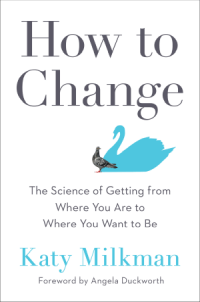The fresh start effect is discussed in Katy Milkman’s book ‘How to Change‘.

This refers to the phenomenon of people being more motivated to make significant changes in their lives at the beginning of a new period, such as a new year, a new week, or a birthday. This effect is due to the psychological belief that new beginnings offer a clean slate and a chance to leave the past behind, making it easier to establish new habits and pursue new goals.
Milkman explains that the fresh start effect can be harnessed to help individuals achieve their goals by setting meaningful milestones and creating a sense of renewal. For example, breaking down a long-term goal into smaller, achievable steps, or using a significant date, such as a birthday, as a starting point for a new habit.
Milkman also warns that relying solely on the fresh start effect may not be enough to sustain long-term behavior change. She suggests combining this approach with other techniques, such as forming habits, tracking progress, and seeking support from others, to increase the likelihood of success.
Below are materials and questions that can be used to learn about and discuss ‘fresh starts’.
Materials:
- Fresh Start Effect: The Indicator Podcast (audio and transcript) Highlighted Version
- ‘How to Change’ by Katy Milkman: The fresh-start effect and how to change as the pandemic recedes (article)
- How the Fresh-Start Effect Creates a Clean Slate (Video)
- Interview with Katy Milkman (How to Change and the Science Behind It)
Vocabulary:
- Improvisation: The act of creating something spontaneously without prior preparation or planning. Example: The comedian’s improvisation skills made the audience laugh uncontrollably.
- Tendency: An inclination towards a particular behavior or action. Example: His tendency to procrastinate always caused him to submit his assignments late.
- Renewal: The act of starting again or making something new again. Example: The company underwent a renewal process after the loss of its key employees.
- Vigor: Energy, enthusiasm, and strength of body or mind. Example: Her vigorous exercise routine kept her fit and healthy.
- Clean slate: A situation in which the past is forgotten, and one is given an opportunity to start again without any negative consequences. Example: After her divorce, she decided to move to a new city and start with a clean slate.
- Narrative: A story or account of events or experiences. Example: The book had a compelling narrative that kept the readers engaged throughout.
- Implications: The possible consequences or effects of a particular action or decision. Example: The implications of the company’s decision to lay off its employees were significant.
- Bracket: To group or categorize things together. Example: The sales report was bracketed into different categories for easy analysis.
- Barrier: An obstacle or impediment that prevents progress or hinders achievement. Example: Her fear of public speaking was a significant barrier to her career advancement.
- Anticipate: To expect or predict that something will happen. Example: The weather forecast anticipated a heavy snowfall.
- Wired to: Naturally inclined or predisposed to behave in a particular way. Example: Some people are wired to be more introverted than others.
- Instant gratification: The desire for immediate satisfaction or pleasure without delay or effort. Example: Her addiction to online shopping was driven by her need for instant gratification.
- Bite-sized chunks: Small and manageable portions of work or information. Example: Breaking down a complex project into bite-sized chunks made it easier to accomplish.
- Hack my life: To find a quick and easy solution to a problem. Example: She discovered a new trick to hack her life and save time in the morning.
- Looming: To appear imminent or threatening. Example: The deadline was looming, and she still had a lot of work to do.
- Binge-watch: To watch several episodes of a TV show or movie in succession. Example: She spent the whole weekend binge-watching her favorite show on Netflix.
- Resonating: Having an emotional or intellectual impact or connection. Example: The speaker’s words resonated with the audience and left a lasting impression.
- Rejuvenated: To feel refreshed and revitalized. Example: She felt rejuvenated after a relaxing weekend at the spa.
- One fell swoop: To accomplish something in a single action or with one stroke. Example: She managed to clean the entire house in one fell swoop.
- Procrastination: The act of delaying or putting off tasks or actions. Example: Her habit of procrastination often caused her to miss important deadlines.
- Wiggle room: Space or flexibility to allow for mistakes or unforeseen events. Example: The project timeline had enough wiggle room to account for unexpected delays.
- On track: Making progress towards a particular goal or objective. Example: Despite some setbacks, she was still on track to complete the project on time.
Discussion Questions:
- What is your Sunday night/Monday morning routine? Do you have any ‘start of the week’ habits?
- What significant ‘fresh start’ experiences have you had in your life?
- Have you ever been ‘the new kid’ in class or the ‘new person’ in some situation where most people already knew each other? How was that?
- Think of times when you tried something new or different (new haircut, different club activity, fresh relationship). How did the change affect you? How long did changes last?
- It’s a new school year. Spring is almost here. Covid isn’t over, but social distancing (kind of) is.
What fresh starts are you making (or considering) these days? - How is your semester going so far?
- Do you make new year’s resolutions? If so, what were they this year?
- Which parts of your life feel ‘stale’ (not fresh)?
- How did you deal with ‘fresh starts’ during the Covid era?
- Do you think a ‘fresh start’ approach can make a difference in achieving your goals?
Related Song of the Week: New Beginning by Tracy Chapman
Views: 558






Leave a Reply